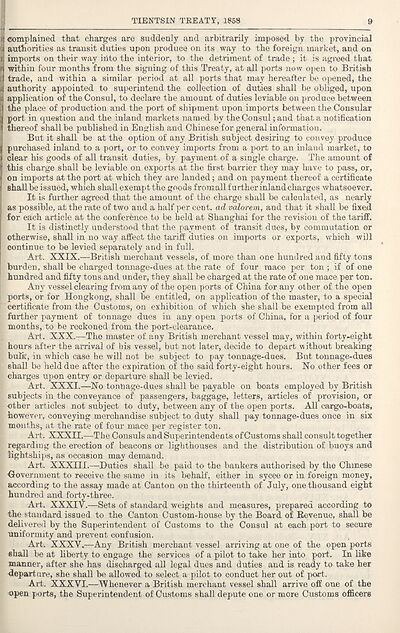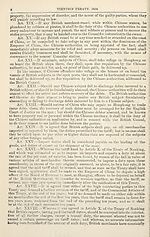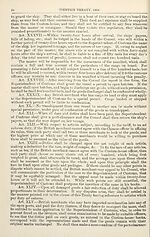1926
(61) Page 9
Download files
Complete book:
Individual page:
Thumbnail gallery: Grid view | List view

TIENTSIN TREATY, 1858
complained that charges are suddenly and arbitrarily imposed by the provincial
authorities as transit duties upon produce on its way to the foreign market, and on
imports on their way iiito the interior, to the detriment of trade ; it is agreed that
within four months from the signing of this Treaty, at all ports now open to British
trade, and within a similar period at all ports that may hereafter be opened, the
authority appointed to superintend the collection of duties shall be obliged, upon
application of the Consul, to declare the amount of duties leviable on produce between
the place of production and the port of shipment upon imports between the Consular
port in question and the inland markets named by the Consul; and that a notification
thereof shall be published in English and Chinese for general information.
But it shall be at the option of any British subject desiring to convey produce
purchased inland to a port, or to convey imports from a port to an inland market, to
clear his goods of all transit duties, by payment of a single charge. The amount of
this charge shall be leviable on exports at the first barrier they may have to pass, or,
on imports at the port at which they are landed; and on payment thereof a certificate
shall be issued, which shall exempt the goods fromall further inland charges whatsoever.
It is further agreed that the amount of the charge shall be calculated, as nearly
as possible, at the rate of two and a half per cent, ad valorem, and that it shall be fixed
for each article at the conference to be held at Shanghai for the revision of the tariff.
It is distinctly understood that the payment of transit dues, by commutation or
otherwise, shall in no way affect the tariff duties on imports or exports, which will
continue to be levied separately and in full.
Art. XXIX.—British merchant vessels, of more than one hundred and fifty tons
burden, shall be charged tonnage-dues at the rate of four mace per ton ; if of one
hundred and fifty tons and under, they shall be charged at the rate of one mace per ton.
Any vessel clearing from any of the open ports of China for any other of the open
ports, or for Hongkong, shall be entitled, on application of the master, to a special
certificate from the Customs, on exhibition of which she shall be exempted from all
further payment of tonnage dues in any open ports of China, for a period of four
months, to be reckoned from the port-clearance.
Art. XXX.—The master of any British merchant vessel may, within forty-eight
hours after the arrival of bis vessel, but not later, decide to depart without breaking
bulk, in which case he will not be subject to pay tonnage-dues. But tonnage-dues
shall be held due after the expiration of the said forty-eight hours. No other fees or
charges upon entry or departure shall be levied.
Art. XXXI.—No tontoage-dues shall be payable on boats employed by British
subjects in the conveyance of passengers, baggage, letters, articles of provision, or
other articles not subject to duty, between any of the open ports. All cargo-boats,
however, conveying merchandise subject to duty shall pay tonnage-dues once in six
months, at the rate of four mace per register ton.
Art. XXXII.—The Consuls and Superintendents of Customs shall consult together
regarding the erection of beacons or lighthouses and the distribution of buoys and
lightships, as occasion may demand.
Art. XXXIII.—Duties shall be paid to the bankers authorised by the Chinese
■Government to receive the same in its behalf, either in sycee or in foreign money,
according to the assay made at Canton on the thirteenth of July, one thousand eight
hundred and forty-three.
Art. XXXIY.—Sets of standard weights and measures, prepared according to
the standard issued to the Canton Custom-house by the Board of Revenue, shall be
delivered by the Superintendent of Customs to the Consul at each port to secure
uniformity and prevent confusion.
Art. XXXV,—Any British merchant vessel arriving at one of the open ports
flhall be at liberty to engage the services of a pilot to take her into port. In like
manner, after she has discharged all legal dues and duties and is ready to take her
departure, she shall be allowed to select a pilot to conduct her out of port.
Art. XXXVI.—“Whenever a British merchant vessel shall arrive off one of the
open ports, the Superintendent of Customs shall depute one or more Customs officers
complained that charges are suddenly and arbitrarily imposed by the provincial
authorities as transit duties upon produce on its way to the foreign market, and on
imports on their way iiito the interior, to the detriment of trade ; it is agreed that
within four months from the signing of this Treaty, at all ports now open to British
trade, and within a similar period at all ports that may hereafter be opened, the
authority appointed to superintend the collection of duties shall be obliged, upon
application of the Consul, to declare the amount of duties leviable on produce between
the place of production and the port of shipment upon imports between the Consular
port in question and the inland markets named by the Consul; and that a notification
thereof shall be published in English and Chinese for general information.
But it shall be at the option of any British subject desiring to convey produce
purchased inland to a port, or to convey imports from a port to an inland market, to
clear his goods of all transit duties, by payment of a single charge. The amount of
this charge shall be leviable on exports at the first barrier they may have to pass, or,
on imports at the port at which they are landed; and on payment thereof a certificate
shall be issued, which shall exempt the goods fromall further inland charges whatsoever.
It is further agreed that the amount of the charge shall be calculated, as nearly
as possible, at the rate of two and a half per cent, ad valorem, and that it shall be fixed
for each article at the conference to be held at Shanghai for the revision of the tariff.
It is distinctly understood that the payment of transit dues, by commutation or
otherwise, shall in no way affect the tariff duties on imports or exports, which will
continue to be levied separately and in full.
Art. XXIX.—British merchant vessels, of more than one hundred and fifty tons
burden, shall be charged tonnage-dues at the rate of four mace per ton ; if of one
hundred and fifty tons and under, they shall be charged at the rate of one mace per ton.
Any vessel clearing from any of the open ports of China for any other of the open
ports, or for Hongkong, shall be entitled, on application of the master, to a special
certificate from the Customs, on exhibition of which she shall be exempted from all
further payment of tonnage dues in any open ports of China, for a period of four
months, to be reckoned from the port-clearance.
Art. XXX.—The master of any British merchant vessel may, within forty-eight
hours after the arrival of bis vessel, but not later, decide to depart without breaking
bulk, in which case he will not be subject to pay tonnage-dues. But tonnage-dues
shall be held due after the expiration of the said forty-eight hours. No other fees or
charges upon entry or departure shall be levied.
Art. XXXI.—No tontoage-dues shall be payable on boats employed by British
subjects in the conveyance of passengers, baggage, letters, articles of provision, or
other articles not subject to duty, between any of the open ports. All cargo-boats,
however, conveying merchandise subject to duty shall pay tonnage-dues once in six
months, at the rate of four mace per register ton.
Art. XXXII.—The Consuls and Superintendents of Customs shall consult together
regarding the erection of beacons or lighthouses and the distribution of buoys and
lightships, as occasion may demand.
Art. XXXIII.—Duties shall be paid to the bankers authorised by the Chinese
■Government to receive the same in its behalf, either in sycee or in foreign money,
according to the assay made at Canton on the thirteenth of July, one thousand eight
hundred and forty-three.
Art. XXXIY.—Sets of standard weights and measures, prepared according to
the standard issued to the Canton Custom-house by the Board of Revenue, shall be
delivered by the Superintendent of Customs to the Consul at each port to secure
uniformity and prevent confusion.
Art. XXXV,—Any British merchant vessel arriving at one of the open ports
flhall be at liberty to engage the services of a pilot to take her into port. In like
manner, after she has discharged all legal dues and duties and is ready to take her
departure, she shall be allowed to select a pilot to conduct her out of port.
Art. XXXVI.—“Whenever a British merchant vessel shall arrive off one of the
open ports, the Superintendent of Customs shall depute one or more Customs officers
Set display mode to:
![]() Universal Viewer |
Universal Viewer | ![]() Mirador |
Large image | Transcription
Mirador |
Large image | Transcription
Images and transcriptions on this page, including medium image downloads, may be used under the Creative Commons Attribution 4.0 International Licence unless otherwise stated. ![]()
| Asian directories and chronicles > 1926 > (61) Page 9 |
|---|
| Permanent URL | https://digital.nls.uk/196488966 |
|---|
| Attribution and copyright: |
|
|---|---|
| Description | Volumes from the Asian 'Directory and Chronicle' series covering 1917-1941, but missing 1919 and 1923. Compiled annually from a multiplicity of local sources and research. They provide listings of each country's active corporations, foreign residents and government agencies of all nationalities for that year, together with their addresses. Content includes: various treaties; coverage of conflicts; currencies and taxes; consular fees; weights and measures; public holidays; festivals and traditions. A source of information for both Western states and communities of foreigners living in Asia. Published by Hongkong Daily Press. |
|---|---|
| Shelfmark | H3.86.1303 |
| Additional NLS resources: |

